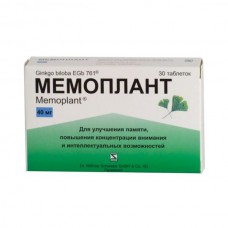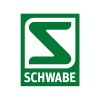Expiration date: 08/2026
The composition and form of issue:
Tablets, film-coated. 1 tablet contains:
Ginkgo biloba leaf dry extract EGb 761 35-67:1 (extractant — 60% acetone) 40 or 80mg
standardized by the content of flavonglycosides-9, 6 mg and terpenlactones-2, 4 mg (1, 12-1, 36 mg-glycosides A, B, C and 1, 04-1, 28 mg-bilobalide)
excipients: sodium croscarmellose foaming emulsion SE2 silicon dioxide colloidal hypromellose lactose monohydrate macrogol 1500 magnesium stearate corn starch MCC talc titanium dioxide E171 iron hydroxide E172
in a blister 10, 15 or 20 PCs.in a pack of cardboard 1, 2, 3 or 5 blisters.
Description of dosage form:
Tablets are round, smooth, covered with a film cover, brownish-yellow color.
Description of pharmacological action:
Increases the resistance of the body, especially brain tissue to hypoxia, inhibits the development of traumatic and toxic brain edema, improves cerebral and peripheral blood circulation, blood rheology.
Indications:
- organic (resulting from age-related circulatory disorders) and functional disorders of the brain such phenomena as memory impairment, reduced ability to concentrate and intellectual capacity, depressive mood, dizziness, tinnitus, headache
- peripheral circulation disorders including obliterating diseases of the lower extremity arteries (intermittent claudication, numbness and cold feet, Raynaud's disease)
- violation of the function of the inner ear, manifested by dizziness, unsteadiness of gait, noise in the ears.
Contraindications:
- hypersensitivity to the components of the drug
- hypocoagulation
- erosive gastritis
- ulcers disease stomach and duodenal ulcer in the acute stage
- acute disorders of cerebral circulation
- acute myocardial infarction
- children up to age 12 years (not enough data on the application).
Use during pregnancy and breast-feeding:
Due to the lack of sufficient clinical data, it is not recommended to use the drug during pregnancy and breastfeeding.
Side effect:
Possible allergic reactions (redness, skin rash, swelling, itching), gastrointestinal disorders, headache, hearing impairment, dizziness, reduced blood clotting.
Observed isolated cases of bleeding in patients taking at the same time a means of reducing the clotting of blood (a causal relationship of bleeding with the drug Ginkgo biloba EGb 761 has not been confirmed).
In case of any adverse events, the drug should be discontinued and consult with your doctor.
Drug interaction:
Not recommended the drug Megaplant patients, constantly receiving aspirin, anticoagulants (direct and indirect actions) as well as medication to decrease blood clotting.
Method of application and doses:
Inside, regardless of the time of meal, without chewing, drinking a small amount of liquid.
If not assigned a different dosing regime should adhere to the following guidelines for the use of the drug.
For symptomatic treatment of cerebral circulation disorders: 1-2 tables. (40-80 mg) 3 times a day. The duration of treatment — at least 8 weeks.
In violation of peripheral blood circulation: 1 table. (40 mg) 3 times a day, or 2 table. (80 mg), 2 times a day. The duration of treatment-at least 6 weeks.
In vascular and involutional pathology of the inner ear: 1 table. (40 mg) 3 times a day, or 2 table. (80 mg), 2 times a day. The duration of treatment-6-8 weeks.
If the next dose was missed or an insufficient amount of the drug was taken, the subsequent dose should be taken in accordance with the instructions.
Overdose:
Cases of overdose are not registered.
Memoprint the drug is generally well tolerated.
Special instruction:
In case of frequent feelings of dizziness and noise in the ears, as well as in case of sudden deterioration or loss of hearing — you should immediately consult a doctor.
The drug includes lactose, and therefore it is not recommended to appoint patients with congenital galactosemia, malabsorption syndrome of glucose or galactose, or congenital lactase deficiency.





